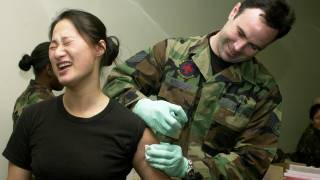Houston ICE Confirms 7 Mumps Cases in February 2019

Seven adult detainees have been confirmed with mumps at a U.S. Immigration and Customs Enforcement (ICE) facility in Houston, on February 9, 2019.
According to a Houston Health Department (HHD) press release, all seven individuals were detained during their infectious period. There is no evidence the mumps virus was transmitted to anyone outside of the facility.
This HHD announcement follows the Texas Department of State Health Services (DSHS) statement on January 25, 2019, which said ‘DSHS is investigating multiple cases and outbreaks of mumps in immigration centers located throughout Texas.’
“Since these individuals were isolated inside the (ICE) facility during the period they were infectious, we do not anticipate these cases posing a threat to the community,” said Dr. David Persse, Houston’s local health authority and EMS medical director.
“Properly vaccinating your children isn’t just about protecting your child, it’s about protecting your entire family and your community,” said Dr. Persse.
Mumps is a contagious disease caused by a virus. It typically starts with a few days of fever, headache, muscle aches, tiredness, and loss of appetite, followed by swollen salivary glands, says the Centers for Disease Control and Prevention (CDC).
While rare, mumps outbreaks have previously occurred in Central America, in the USA, and in the Houston, Texas region.
Recent mumps news reports include the following:
- Central America: During September 2018, the Honduran Ministry of Health (MOH) announced a state of emergency regarding 5,500 mumps cases reported during 2018. This data is significantly different from 2013 through 2017 when only 138 cases of mumps were reported annually. Additionally, the Honduran MOH said that there were approximately 3,266,931 adults (34% of the total population) susceptible to mumps because they never received the MMR vaccine as children.
- USA: During 2019, 18 states have reported mumps infections in 58 people to CDC.
- Texas: During 2016, the Texas Department of State Health Services confirmed 191 mumps cases. HHD said it is working with the ICE facility on infection control methods and will conduct an on-site visit in the coming days.
A major factor contributing to mumps outbreaks is being in a crowded environment, such as attending the same class, playing on the same sports team, or living in a dormitory with a person who is infectious with mumps, says the CDC.
Also, certain behaviors that result in exchanging salivae, such as kissing or sharing utensils, cups, lip balm or cigarettes, might increase the spread of the virus.
The MMR vaccine prevents most, but not all, cases of mumps and complications caused by the disease.
The mumps component of the MMR vaccine has reported being 88 percent effective when a person gets 2 vaccine doses.
According to another study, one potential cause of these mumps outbreaks is ‘waning-immunization.’
A previous study from the Harvard T.H. Chan School of Public Health found that vaccine-derived immune protection against mumps persists on average for about 27 years, after the last administered dose.
In response to the expanding number of mumps outbreaks, the CDC released guidance in October 2017, regarding when the 3rd dose of mumps vaccine is appropriate.
This new CDC guidance did not recommend a 3rd MMR dose outside of a ‘confirmed mumps outbreak’.
Another reason for mumps outbreaks could be under-vaccinations by international travelers.
The CDC says international travelers who cannot show that they were vaccinated or are otherwise protected against mumps, should get vaccinated before leaving the USA.
In the USA, most pharmacies offer MMR vaccination services.
Children under the age of 12 years old may also get MMR vaccine, which protects against measles, mumps, rubella, and varicella (chickenpox).
To schedule an appointment with a pharmacist visit this site.
The CDC Vaccine Price List provides private sector vaccine prices for general information.
Vaccine discounts can be found here.
Vaccines, like any medicine, can have side effects, says the CDC. You are encouraged to report negative side effects of vaccines to the FDA or CDC.
Our Trust Standards: Medical Advisory Committee


























